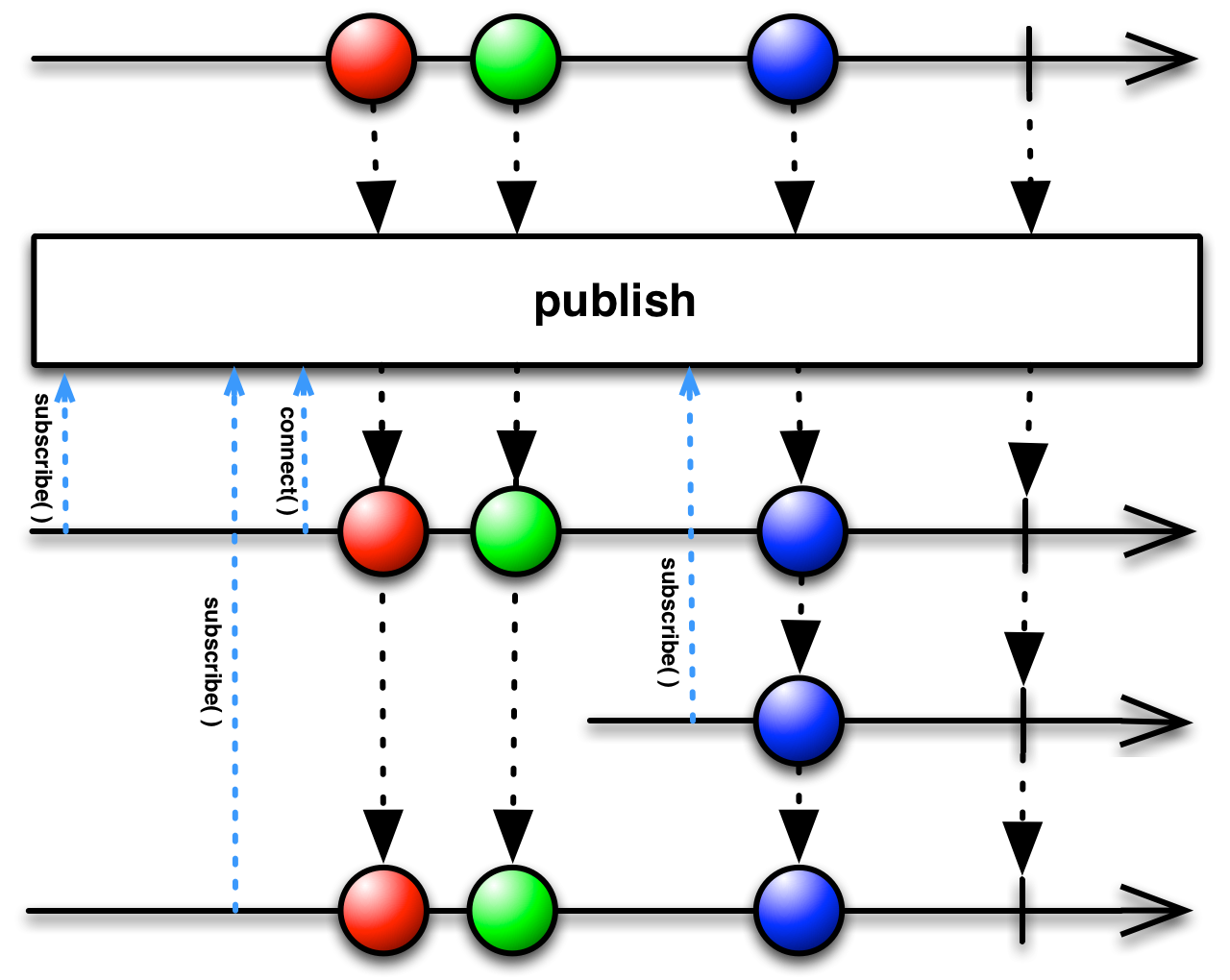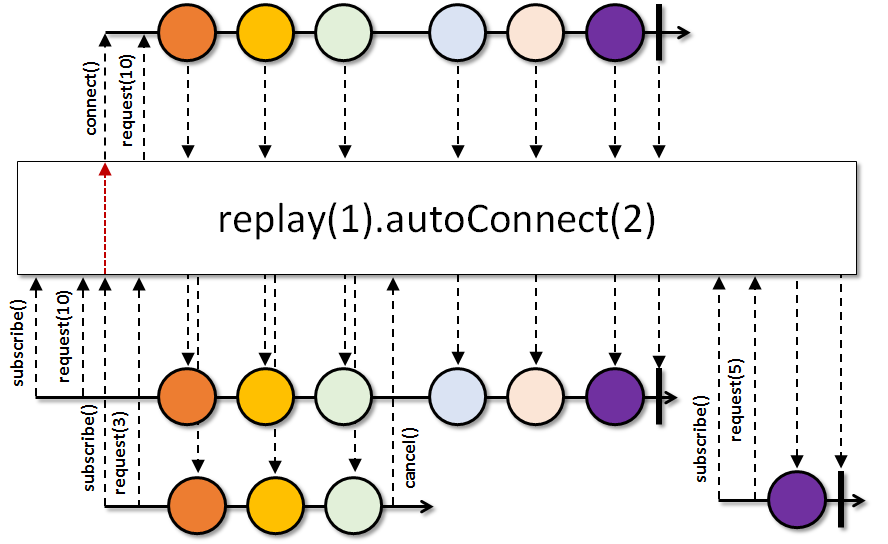- java.lang.Object
-
- io.reactivex.Flowable<T>
-
- io.reactivex.flowables.ConnectableFlowable<T>
-
- Type Parameters:
T- the type of items emitted by theConnectableFlowable
- All Implemented Interfaces:
- Publisher<T>
public abstract class ConnectableFlowable<T> extends Flowable<T>
AConnectableFlowableresembles an ordinaryFlowable, except that it does not begin emitting items when it is subscribed to, but only when itsconnect(io.reactivex.functions.Consumer<? super io.reactivex.disposables.Disposable>)method is called. In this way you can wait for all intendedSubscribers toFlowable.subscribe()to theFlowablebefore theFlowablebegins emitting items.
-
-
Constructor Summary
Constructors Constructor and Description ConnectableFlowable()
-
Method Summary
All Methods Instance Methods Abstract Methods Concrete Methods Modifier and Type Method and Description Flowable<T>autoConnect()Returns a Flowable that automatically connects (at most once) to this ConnectableFlowable when the first Subscriber subscribes.Flowable<T>autoConnect(int numberOfSubscribers)Returns a Flowable that automatically connects (at most once) to this ConnectableFlowable when the specified number of Subscribers subscribe to it.Flowable<T>autoConnect(int numberOfSubscribers, Consumer<? super Disposable> connection)Returns a Flowable that automatically connects (at most once) to this ConnectableFlowable when the specified number of Subscribers subscribe to it and calls the specified callback with the Subscription associated with the established connection.Disposableconnect()Instructs theConnectableFlowableto begin emitting the items from its underlyingFlowableto itsSubscribers.abstract voidconnect(Consumer<? super Disposable> connection)Instructs theConnectableFlowableto begin emitting the items from its underlyingFlowableto itsSubscribers.Flowable<T>refCount()Returns aFlowablethat stays connected to thisConnectableFlowableas long as there is at least one subscription to thisConnectableFlowable.Flowable<T>refCount(int subscriberCount)Connects to the upstreamConnectableFlowableif the number of subscribed subscriber reaches the specified count and disconnect if all subscribers have unsubscribed.Flowable<T>refCount(int subscriberCount, long timeout, TimeUnit unit)Connects to the upstreamConnectableFlowableif the number of subscribed subscriber reaches the specified count and disconnect after the specified timeout if all subscribers have unsubscribed.Flowable<T>refCount(int subscriberCount, long timeout, TimeUnit unit, Scheduler scheduler)Connects to the upstreamConnectableFlowableif the number of subscribed subscriber reaches the specified count and disconnect after the specified timeout if all subscribers have unsubscribed.Flowable<T>refCount(long timeout, TimeUnit unit)Connects to the upstreamConnectableFlowableif the number of subscribed subscriber reaches 1 and disconnect after the specified timeout if all subscribers have unsubscribed.Flowable<T>refCount(long timeout, TimeUnit unit, Scheduler scheduler)Connects to the upstreamConnectableFlowableif the number of subscribed subscriber reaches 1 and disconnect after the specified timeout if all subscribers have unsubscribed.-
Methods inherited from class io.reactivex.Flowable
all, amb, ambArray, ambWith, any, as, blockingFirst, blockingFirst, blockingForEach, blockingIterable, blockingIterable, blockingLast, blockingLast, blockingLatest, blockingMostRecent, blockingNext, blockingSingle, blockingSingle, blockingSubscribe, blockingSubscribe, blockingSubscribe, blockingSubscribe, blockingSubscribe, blockingSubscribe, blockingSubscribe, blockingSubscribe, buffer, buffer, buffer, buffer, buffer, buffer, buffer, buffer, buffer, buffer, buffer, buffer, buffer, buffer, buffer, buffer, buffer, buffer, buffer, bufferSize, cache, cacheWithInitialCapacity, cast, collect, collectInto, combineLatest, combineLatest, combineLatest, combineLatest, combineLatest, combineLatest, combineLatest, combineLatest, combineLatest, combineLatest, combineLatest, combineLatest, combineLatest, combineLatestDelayError, combineLatestDelayError, combineLatestDelayError, combineLatestDelayError, combineLatestDelayError, combineLatestDelayError, compose, concat, concat, concat, concat, concat, concat, concatArray, concatArrayDelayError, concatArrayEager, concatArrayEager, concatArrayEagerDelayError, concatArrayEagerDelayError, concatDelayError, concatDelayError, concatDelayError, concatEager, concatEager, concatEager, concatEager, concatMap, concatMap, concatMapCompletable, concatMapCompletable, concatMapCompletableDelayError, concatMapCompletableDelayError, concatMapCompletableDelayError, concatMapDelayError, concatMapDelayError, concatMapEager, concatMapEager, concatMapEagerDelayError, concatMapEagerDelayError, concatMapIterable, concatMapIterable, concatMapMaybe, concatMapMaybe, concatMapMaybeDelayError, concatMapMaybeDelayError, concatMapMaybeDelayError, concatMapSingle, concatMapSingle, concatMapSingleDelayError, concatMapSingleDelayError, concatMapSingleDelayError, concatWith, concatWith, concatWith, concatWith, contains, count, create, debounce, debounce, debounce, defaultIfEmpty, defer, delay, delay, delay, delay, delay, delay, delaySubscription, delaySubscription, delaySubscription, dematerialize, dematerialize, distinct, distinct, distinct, distinctUntilChanged, distinctUntilChanged, distinctUntilChanged, doAfterNext, doAfterTerminate, doFinally, doOnCancel, doOnComplete, doOnEach, doOnEach, doOnError, doOnLifecycle, doOnNext, doOnRequest, doOnSubscribe, doOnTerminate, elementAt, elementAt, elementAtOrError, empty, error, error, filter, first, firstElement, firstOrError, flatMap, flatMap, flatMap, flatMap, flatMap, flatMap, flatMap, flatMap, flatMap, flatMap, flatMap, flatMap, flatMapCompletable, flatMapCompletable, flatMapIterable, flatMapIterable, flatMapIterable, flatMapIterable, flatMapMaybe, flatMapMaybe, flatMapSingle, flatMapSingle, forEach, forEachWhile, forEachWhile, forEachWhile, fromArray, fromCallable, fromFuture, fromFuture, fromFuture, fromFuture, fromIterable, fromPublisher, generate, generate, generate, generate, generate, groupBy, groupBy, groupBy, groupBy, groupBy, groupBy, groupJoin, hide, ignoreElements, interval, interval, interval, interval, intervalRange, intervalRange, isEmpty, join, just, just, just, just, just, just, just, just, just, just, last, lastElement, lastOrError, lift, limit, map, materialize, merge, merge, merge, merge, merge, merge, merge, merge, mergeArray, mergeArray, mergeArrayDelayError, mergeArrayDelayError, mergeDelayError, mergeDelayError, mergeDelayError, mergeDelayError, mergeDelayError, mergeDelayError, mergeDelayError, mergeDelayError, mergeWith, mergeWith, mergeWith, mergeWith, never, observeOn, observeOn, observeOn, ofType, onBackpressureBuffer, onBackpressureBuffer, onBackpressureBuffer, onBackpressureBuffer, onBackpressureBuffer, onBackpressureBuffer, onBackpressureBuffer, onBackpressureBuffer, onBackpressureDrop, onBackpressureDrop, onBackpressureLatest, onErrorResumeNext, onErrorResumeNext, onErrorReturn, onErrorReturnItem, onExceptionResumeNext, onTerminateDetach, parallel, parallel, parallel, publish, publish, publish, publish, range, rangeLong, rebatchRequests, reduce, reduce, reduceWith, repeat, repeat, repeatUntil, repeatWhen, replay, replay, replay, replay, replay, replay, replay, replay, replay, replay, replay, replay, replay, replay, replay, replay, retry, retry, retry, retry, retry, retryUntil, retryWhen, safeSubscribe, sample, sample, sample, sample, sample, sample, scan, scan, scanWith, sequenceEqual, sequenceEqual, sequenceEqual, sequenceEqual, serialize, share, single, singleElement, singleOrError, skip, skip, skip, skipLast, skipLast, skipLast, skipLast, skipLast, skipLast, skipUntil, skipWhile, sorted, sorted, startWith, startWith, startWith, startWithArray, subscribe, subscribe, subscribe, subscribe, subscribe, subscribe, subscribe, subscribeActual, subscribeOn, subscribeOn, subscribeWith, switchIfEmpty, switchMap, switchMap, switchMapCompletable, switchMapCompletableDelayError, switchMapDelayError, switchMapDelayError, switchMapMaybe, switchMapMaybeDelayError, switchMapSingle, switchMapSingleDelayError, switchOnNext, switchOnNext, switchOnNextDelayError, switchOnNextDelayError, take, take, take, takeLast, takeLast, takeLast, takeLast, takeLast, takeLast, takeLast, takeLast, takeLast, takeUntil, takeUntil, takeWhile, test, test, test, throttleFirst, throttleFirst, throttleLast, throttleLast, throttleLatest, throttleLatest, throttleLatest, throttleLatest, throttleWithTimeout, throttleWithTimeout, timeInterval, timeInterval, timeInterval, timeInterval, timeout, timeout, timeout, timeout, timeout, timeout, timeout, timeout, timer, timer, timestamp, timestamp, timestamp, timestamp, to, toFuture, toList, toList, toList, toMap, toMap, toMap, toMultimap, toMultimap, toMultimap, toMultimap, toObservable, toSortedList, toSortedList, toSortedList, toSortedList, unsafeCreate, unsubscribeOn, using, using, window, window, window, window, window, window, window, window, window, window, window, window, window, window, window, window, window, window, window, withLatestFrom, withLatestFrom, withLatestFrom, withLatestFrom, withLatestFrom, withLatestFrom, zip, zip, zip, zip, zip, zip, zip, zip, zip, zip, zip, zip, zipArray, zipIterable, zipWith, zipWith, zipWith, zipWith
-
-
-
-
Method Detail
-
connect
public abstract void connect(@NonNull Consumer<? super Disposable> connection)
Instructs theConnectableFlowableto begin emitting the items from its underlyingFlowableto itsSubscribers.- Parameters:
connection- the action that receives the connection subscription before the subscription to source happens allowing the caller to synchronously disconnect a synchronous source- See Also:
- ReactiveX documentation: Connect
-
connect
public final Disposable connect()
Instructs theConnectableFlowableto begin emitting the items from its underlyingFlowableto itsSubscribers.To disconnect from a synchronous source, use the
connect(io.reactivex.functions.Consumer)method.- Returns:
- the subscription representing the connection
- See Also:
- ReactiveX documentation: Connect
-
refCount
@NonNull @CheckReturnValue @SchedulerSupport(value="none") @BackpressureSupport(value=PASS_THROUGH) public Flowable<T> refCount()
Returns aFlowablethat stays connected to thisConnectableFlowableas long as there is at least one subscription to thisConnectableFlowable.- Backpressure:
- The operator itself doesn't interfere with backpressure which is determined by the upstream
ConnectableFlowable's backpressure behavior. - Scheduler:
- This
refCountoverload does not operate on any particularScheduler.
- Returns:
- a
Flowable - See Also:
- ReactiveX documentation: RefCount,
refCount(int),refCount(long, TimeUnit),refCount(int, long, TimeUnit)
-
refCount
@CheckReturnValue @SchedulerSupport(value="none") @BackpressureSupport(value=PASS_THROUGH) public final Flowable<T> refCount(int subscriberCount)
Connects to the upstreamConnectableFlowableif the number of subscribed subscriber reaches the specified count and disconnect if all subscribers have unsubscribed.- Backpressure:
- The operator itself doesn't interfere with backpressure which is determined by the upstream
ConnectableFlowable's backpressure behavior. - Scheduler:
- This
refCountoverload does not operate on any particularScheduler.
History: 2.1.14 - experimental
- Parameters:
subscriberCount- the number of subscribers required to connect to the upstream- Returns:
- the new Flowable instance
- Since:
- 2.2
-
refCount
@CheckReturnValue @SchedulerSupport(value="io.reactivex:computation") @BackpressureSupport(value=PASS_THROUGH) public final Flowable<T> refCount(long timeout, TimeUnit unit)
Connects to the upstreamConnectableFlowableif the number of subscribed subscriber reaches 1 and disconnect after the specified timeout if all subscribers have unsubscribed.- Backpressure:
- The operator itself doesn't interfere with backpressure which is determined by the upstream
ConnectableFlowable's backpressure behavior. - Scheduler:
- This
refCountoverload operates on thecomputationScheduler.
History: 2.1.14 - experimental
- Parameters:
timeout- the time to wait before disconnecting after all subscribers unsubscribedunit- the time unit of the timeout- Returns:
- the new Flowable instance
- Since:
- 2.2
- See Also:
refCount(long, TimeUnit, Scheduler)
-
refCount
@CheckReturnValue @SchedulerSupport(value="custom") @BackpressureSupport(value=PASS_THROUGH) public final Flowable<T> refCount(long timeout, TimeUnit unit, Scheduler scheduler)
Connects to the upstreamConnectableFlowableif the number of subscribed subscriber reaches 1 and disconnect after the specified timeout if all subscribers have unsubscribed.- Backpressure:
- The operator itself doesn't interfere with backpressure which is determined by the upstream
ConnectableFlowable's backpressure behavior. - Scheduler:
- This
refCountoverload operates on the specifiedScheduler.
History: 2.1.14 - experimental
- Parameters:
timeout- the time to wait before disconnecting after all subscribers unsubscribedunit- the time unit of the timeoutscheduler- the target scheduler to wait on before disconnecting- Returns:
- the new Flowable instance
- Since:
- 2.2
-
refCount
@CheckReturnValue @SchedulerSupport(value="io.reactivex:computation") @BackpressureSupport(value=PASS_THROUGH) public final Flowable<T> refCount(int subscriberCount, long timeout, TimeUnit unit)
Connects to the upstreamConnectableFlowableif the number of subscribed subscriber reaches the specified count and disconnect after the specified timeout if all subscribers have unsubscribed.- Backpressure:
- The operator itself doesn't interfere with backpressure which is determined by the upstream
ConnectableFlowable's backpressure behavior. - Scheduler:
- This
refCountoverload operates on thecomputationScheduler.
History: 2.1.14 - experimental
- Parameters:
subscriberCount- the number of subscribers required to connect to the upstreamtimeout- the time to wait before disconnecting after all subscribers unsubscribedunit- the time unit of the timeout- Returns:
- the new Flowable instance
- Since:
- 2.2
- See Also:
refCount(int, long, TimeUnit, Scheduler)
-
refCount
@CheckReturnValue @SchedulerSupport(value="custom") @BackpressureSupport(value=PASS_THROUGH) public final Flowable<T> refCount(int subscriberCount, long timeout, TimeUnit unit, Scheduler scheduler)
Connects to the upstreamConnectableFlowableif the number of subscribed subscriber reaches the specified count and disconnect after the specified timeout if all subscribers have unsubscribed.- Backpressure:
- The operator itself doesn't interfere with backpressure which is determined by the upstream
ConnectableFlowable's backpressure behavior. - Scheduler:
- This
refCountoverload operates on the specifiedScheduler.
History: 2.1.14 - experimental
- Parameters:
subscriberCount- the number of subscribers required to connect to the upstreamtimeout- the time to wait before disconnecting after all subscribers unsubscribedunit- the time unit of the timeoutscheduler- the target scheduler to wait on before disconnecting- Returns:
- the new Flowable instance
- Since:
- 2.2
-
autoConnect
@NonNull public Flowable<T> autoConnect()
Returns a Flowable that automatically connects (at most once) to this ConnectableFlowable when the first Subscriber subscribes.
The connection happens after the first subscription and happens at most once during the lifetime of the returned Flowable. If this ConnectableFlowable terminates, the connection is never renewed, no matter how Subscribers come and go. Use
refCount()to renew a connection or dispose an active connection when allSubscribers have cancelled theirSubscriptions.This overload does not allow disconnecting the connection established via
connect(Consumer). Use theautoConnect(int, Consumer)overload to gain access to theDisposablerepresenting the only connection.- Returns:
- a Flowable that automatically connects to this ConnectableFlowable when the first Subscriber subscribes
- See Also:
refCount(),autoConnect(int, Consumer)
-
autoConnect
@NonNull public Flowable<T> autoConnect(int numberOfSubscribers)
Returns a Flowable that automatically connects (at most once) to this ConnectableFlowable when the specified number of Subscribers subscribe to it.
The connection happens after the given number of subscriptions and happens at most once during the lifetime of the returned Flowable. If this ConnectableFlowable terminates, the connection is never renewed, no matter how Subscribers come and go. Use
refCount()to renew a connection or dispose an active connection when allSubscribers have cancelled theirSubscriptions.This overload does not allow disconnecting the connection established via
connect(Consumer). Use theautoConnect(int, Consumer)overload to gain access to theDisposablerepresenting the only connection.- Parameters:
numberOfSubscribers- the number of subscribers to await before calling connect on the ConnectableFlowable. A non-positive value indicates an immediate connection.- Returns:
- a Flowable that automatically connects to this ConnectableFlowable when the specified number of Subscribers subscribe to it
-
autoConnect
@NonNull public Flowable<T> autoConnect(int numberOfSubscribers, @NonNull Consumer<? super Disposable> connection)
Returns a Flowable that automatically connects (at most once) to this ConnectableFlowable when the specified number of Subscribers subscribe to it and calls the specified callback with the Subscription associated with the established connection.
The connection happens after the given number of subscriptions and happens at most once during the lifetime of the returned Flowable. If this ConnectableFlowable terminates, the connection is never renewed, no matter how Subscribers come and go. Use
refCount()to renew a connection or dispose an active connection when allSubscribers have cancelled theirSubscriptions.- Parameters:
numberOfSubscribers- the number of subscribers to await before calling connect on the ConnectableFlowable. A non-positive value indicates an immediate connection.connection- the callback Consumer that will receive the Subscription representing the established connection- Returns:
- a Flowable that automatically connects to this ConnectableFlowable when the specified number of Subscribers subscribe to it and calls the specified callback with the Subscription associated with the established connection
-
-